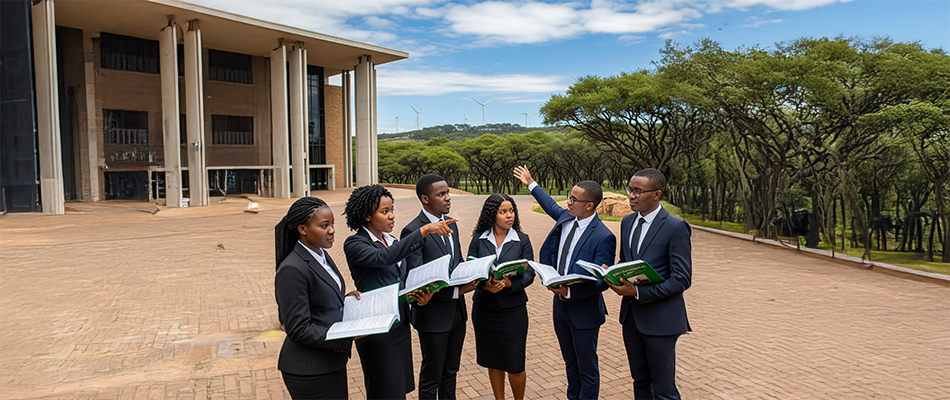In South Africa, environmental law is becoming one of the most important electives in LLB programmes, especially for students passionate about climate policy, sustainability, and protecting natural resources. Environmental law electives explore how legislation, regulation, and legal processes protect the environment while balancing social and economic needs. This area of law addresses urgent global and local challenges such as pollution, biodiversity loss, and climate change, preparing students for impactful careers in advocacy, policy reform, and compliance. The October LLB elective environmental law option offers an opportunity for learners to begin studying environmental law at a strategically beneficial time, ensuring they stay ahead of evolving regulations and career trends. By gaining knowledge in emerging environmental regulation, advocacy skills, and sustainable law careers, students can position themselves as leaders in this growing legal field.
In this article, we will explore the scope of environmental law electives, their career potential, sample syllabus, and why this elective is a valuable choice for the October intake.
Table of Contents
- What Are Environmental Law Electives in an LLB Programme?
- Module Focus: What You Will Study?
- The Rise of Emerging Environmental Regulation in South Africa
- Environmental Law in Public-Interest Law Practice
- Advocacy Careers and Opportunities
- Sustainable Law Careers in South Africa
- Skills You Develop Through Environmental Law Electives
- Choosing Environmental Law in Regenesys LLB Programme
- Why is the October LLB Elective Environmental Law Intake Timely?
- Conclusion
- Know Why Environmental Law Electives Are Essential for LLB Students in South Africa – FAQs

What Are Environmental Law Electives in an LLB Programme?
Environmental law electives are specialised modules that focus on the rules, regulations, and legal principles governing the protection of the environment. They cover everything from constitutional environmental rights to international treaties, enabling students to engage with both local and global issues. Within an LLB elective South Africa context, these electives are designed to give students the analytical and practical skills needed to navigate complex environmental challenges.
Many learners are drawn to this elective because it addresses real-world problems and offers opportunities to work in public interest advocacy, policy-making, and corporate compliance. As environmental concerns become increasingly intertwined with economic and social development, this elective offers a highly relevant foundation for future legal work.
The following are the core features of environmental law electives in an LLB curriculum:
1. Specialised Legal Knowledge
Students gain an in-depth understanding of legislation, case law, and administrative processes that govern environmental management. This includes laws at the national, provincial, and municipal levels.
2. Focus on Climate and Sustainability
With climate law in SA forming a key part of the module, students examine climate change policies, renewable energy laws, and carbon tax legislation. These topics are increasingly critical for both legal practice and corporate governance.
3. Integration with Public Interest Law
Environmental law is often studied as a public interest law elective, allowing learners to contribute to environmental justice causes and represent communities impacted by environmental harm.
Read more on LLB Programme in South Africa: Career, Fees & Subjects here!
Module Focus: What You Will Study?
The module focus in environmental law electives provides a structured approach to understanding how environmental protection operates within the legal system. Students explore constitutional provisions, statutory frameworks, and case studies to see how these laws apply in practice. The emphasis is on building a strong legal foundation while also understanding the socio-economic and political dimensions of environmental issues.
By studying this module, students are equipped to critically assess environmental policies, challenge non-compliance, and contribute to sustainable legal reforms. This makes it an appealing choice for those seeking to combine academic study with practical application in LLB careers in South Africa.
Here are the key areas typically covered in the module:
1. Environmental Rights in the Constitution
You will examine Section 24 of the South African Constitution, which guarantees everyone the right to an environment that is not harmful to health and well-being. The module explores how courts interpret and enforce this right.
2. Pollution Control and Waste Management Law
Students learn about laws aimed at reducing pollution and managing waste sustainably. This includes both prevention measures and penalties for non-compliance.
3. Climate Law in SA
A deep dive into South Africa’s climate change policies, carbon tax regime, and litigation strategies to hold polluters accountable. This area is vital for those planning sustainable law careers.
4. Biodiversity Protection
Focuses on conservation laws protecting endangered species, ecosystems, and heritage sites. The National Environmental Management: Biodiversity Act is a key statute studied here.
Read on Complete LLB Guide: Study Modes, Subjects, Salary & More here!
The Rise of Emerging Environmental Regulation in South Africa
Over the past decade, environmental law in South Africa has expanded rapidly, introducing new policies to address urgent challenges. From climate adaptation strategies to pollution reduction, the legislative landscape is evolving in response to both domestic needs and international obligations. This changing framework means legal practitioners must stay informed and adaptable.
Environmental law electives provide the perfect platform to develop this awareness and prepare for careers in compliance, advocacy, and governance. For LLB students, understanding emerging environmental regulation is no longer optional – it’s essential.
Examples of emerging regulations you may study include:
1. Carbon Tax Legislation
The Carbon Tax Act, which came into effect in 2019, sets a financial cost for greenhouse gas emissions. Students analyse how it impacts industry and drives investment in cleaner technologies.
2. Renewable Energy Frameworks
Legal measures supporting wind, solar, and other renewable projects, including licensing requirements and environmental impact assessments. These laws are crucial for transitioning to a low-carbon economy.
3. Water Management Regulations
Policies ensuring sustainable use of South Africa’s scarce water resources. This includes allocation rights, quality control, and penalties for overuse or contamination.
4. Waste Management Policies
Recent laws place responsibility on producers to reduce and recycle waste, with stricter penalties for violations.

Environmental Law in Public-Interest Law Practice
Public interest law focuses on representing communities, protecting human rights, and promoting social justice. Environmental law fits naturally into this sphere, as environmental harm often disproportionately affects vulnerable populations.
By selecting environmental law as a public interest law elective, students prepare themselves to work on cases with significant social and ecological impact. This path is ideal for those motivated by advocacy and the desire to bring about positive change. The work can involve courtroom litigation, community consultation, and policy advocacy.
Ways environmental law contributes to public interest practice:
1. Community Representation
Acting on behalf of rural or urban communities whose health and livelihoods are threatened by environmental degradation. Lawyers may fight against unlawful mining or industrial pollution.
2. Legal Advocacy
Using legal tools to challenge policies or corporate actions that harm the environment. Successful advocacy often results in stronger environmental safeguards.
3. Policy Reform
Collaborating with lawmakers and NGOs to draft policies that balance development needs with ecological preservation.
Advocacy Careers and Opportunities
One of the misconceptions about environmental law is that it only leads to work in NGOs. In reality, the field offers a wide variety of career options across public, private, and international sectors. Environmental law electives equip students with skills relevant to advocacy, advisory roles, and corporate environmental compliance. These careers often involve advising on environmental regulations, participating in negotiations, or drafting policies for sustainable development. For those passionate about making a tangible difference, the advocacy route can be highly rewarding. Some of the career paths include:
1. Environmental Advocacy Officer
Works in non-profits to lobby for stronger environmental protections and influence legislation.
2. Climate Policy Analyst
Interprets climate law in SA to shape both government and corporate environmental strategies.
3. Corporate Environmental Advisor
Guides businesses on legal compliance, helping them avoid penalties and improve their sustainability practices.
4. International Agency Lawyer
Represents South Africa in global forums, negotiating environmental treaties and agreements.
Sustainable Law Careers in South Africa
South Africa’s shift towards a low-carbon economy is creating strong demand for lawyers who specialise in environmental issues. By studying environmental law electives, you position yourself for roles that directly contribute to national and global sustainability goals. These careers often involve working with government, NGOs, corporate compliance teams, or renewable energy projects. Below are examples of sustainable law career paths available in the country.
1. Renewable Energy Legal Advisor
Works on project development, compliance checks, and contracts for wind, solar, and other renewable energy initiatives.
2. Environmental Compliance Officer
Ensures that businesses adhere to environmental legislation, minimising ecological harm and avoiding legal penalties.
3. Conservation Policy Consultant
Develops, reviews, and implements conservation and biodiversity protection laws to safeguard natural heritage.
Find out the Top Career Opportunities After Completing LLB Programme here!
Skills You Develop Through Environmental Law Electives
Environmental law electives do far more than introduce you to statutes and regulations – they sharpen critical legal skills essential for career success. This subject demands analytical thinking, a mastery of legislative interpretation, and the ability to communicate complex issues clearly.
The skills gained are transferable, benefiting not just those entering environmental law, but also broader legal and policy work. This makes the elective an excellent choice for those pursuing LLB careers in South Africa or studying via LLB online South Africa platforms. Below are some of the core skills you can expect to develop.
1. Legal Research and Drafting
Ability to craft persuasive legal arguments supported by case law, statutes, and credible academic sources.
2. Policy Analysis
Skills to evaluate environmental laws’ effectiveness and propose legislative or policy improvements.
3. Negotiation and Mediation
Techniques for resolving disputes between developers, communities, and government regulators in a constructive way.
4. Critical Thinking
The capacity to assess complex environmental challenges and develop innovative, lawful solutions.
Read on Exploring Law Subjects: What You Need to Know Before Starting Your LLB?here!
Choosing Environmental Law in Regenesys LLB Programme
In the Regenesys Bachelor of Laws (LLB) programme, students have the opportunity to personalise their studies by selecting from a range of electives that complement the core curriculum. Environmental Law is one such option, designed to equip aspiring legal professionals with a strong understanding of environmental rights, climate law, and sustainable governance.
This elective carries 12 credits and is typically taken in Year 4 of the programme. It focuses on South African environmental legislation, global climate agreements, and practical case studies that prepare students for roles in advocacy, compliance, and policy development.
Some of the other electives available in the Regenesys LLB programme include:
- Accounting for Legal Practice
- Cyber Law
- Deceased Estates
- Insurance Law
- International Business Law
- Medical Law
- Business Management
- Economics
- Financial Accounting
By offering Environmental Law alongside these other electives, Regenesys ensures that students can shape their academic journey to match their professional interests.
Why is the October LLB Elective Environmental Law Intake Timely?
The October LLB elective Environmental Law intake at Regenesys is an excellent opportunity for students to progress strategically in their studies. This timing allows learners to focus deeply on environmental legislation, climate change frameworks, and sustainability issues before the next academic year begins, without disrupting their broader LLB schedule.
As Environmental Law is a Year 4 elective in the Regenesys LLB, taking it in October can position students ahead academically while giving them more flexibility for other modules in subsequent terms.
Here are some of the key advantages of the Regenesys October Environmental Law intake:
1. Flexible Online Learning
The LLB in online mode allows students to balance studies with work or personal commitments, making it accessible to those in different regions of South Africa.
2. Early Academic Progress
Completing the elective ahead of the standard schedule means more room to focus on other Year 4 electives or practical training opportunities later in the year.
3. Alignment with Global and Local Trends
Equips students with up-to-date knowledge on climate law SA, South African environmental statutes, and international agreements – all critical for LLB opportunities in South Africa and beyond.
Conclusion
Choosing environmental law electives is more than just selecting a subject – it’s about preparing yourself to address some of the most pressing legal and environmental challenges of our time. This elective equips you with practical skills, deep legal knowledge, and the ability to make a real difference in sustainability, policy, and advocacy work. At Regenesys Law School, environmental law is offered as one of the key LLB electives, giving you the opportunity to specialise in a field that is in high demand across South Africa.
For those looking to advance their studies further, our October 2025 intake is open for the online LLB programme, with registration closing on 29 September 2025. Take the next step in your legal and professional journey – enrol in our programme today.

Know Why Environmental Law Electives Are Essential for LLB Students in South Africa – FAQs
What are environmental law electives in the LLB programme?
They are optional modules focusing on laws that protect the environment, regulate resources, and address climate change.
How does the October LLB elective environmental law differ from other intakes?
It allows students to complete the module before the start of the main academic year, offering an early advantage.
Can I study environmental law online in South Africa?
Yes, many institutions offer LLB online South Africa options, making it accessible to working students.
What careers can I pursue with an environmental law background?
Careers include advocacy roles, compliance, policy advisory, and sustainable law consultancy.
Is climate law SA part of environmental law electives?
Yes, climate change legislation is a major focus area, covering carbon taxes and renewable energy policies.
Are environmental law electives suitable for public interest law careers?
Absolutely. They are ideal for those interested in community representation and environmental justice advocacy.







